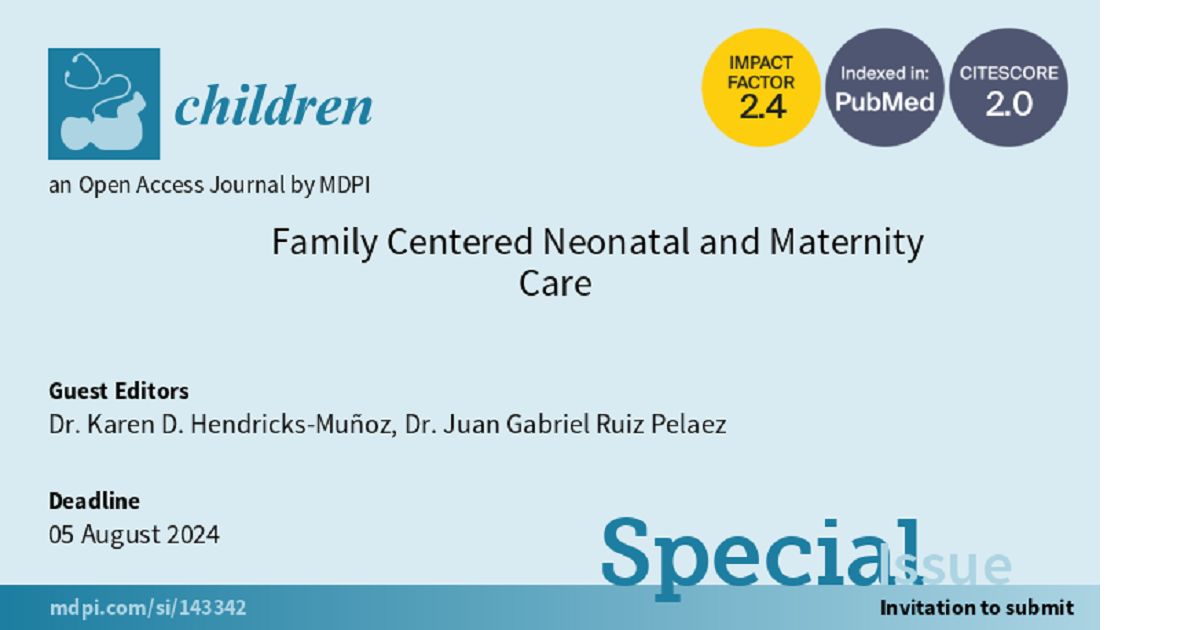- 2.1Impact Factor
- 3.8CiteScore
- 16 daysTime to First Decision
Family Centered Neonatal and Maternity Care
This special issue belongs to the section “Pediatric Nursing“.
Special Issue Information
Dear Colleagues,
In the lasty 50 or so years, with exponential improvements in survival of mothers and sick newborns, a movement towards bringing back mothers and families to the side of their infants while receiving specialized care has gradually spread. Family centered care, where provider collaboration with the family holds an important and vital role in ensuring the ultimate health and well-being of the infant and mother, has become a fundamental care practice in the neonatal intensive care unit and maternity care service. Though the definition of family centered neonatal and maternity care differs somewhat between the various disciplines, the common concepts include individualized care, which promotes infant–parent engagement, is culturally sensitive, and actively involves the parents/family in decision making. This Special Issue will cover a variety of topics related to family-centered neonatal and maternity care including, but not limited to, scientific outcomes, barriers and interventional engagement in early development and postpartum to later implementation; spanning from infant and maternal practices that influence success and outcomes, pedagogy related to psychosocial influences, cultural implications and family or provider perceptions or disparities. Article types will include research articles, review articles, perspective articles, mini-reviews, opinion papers, case studies, and short communications.
Dr. Karen D. Hendricks-Muñoz
Dr. Juan Gabriel Ruiz Pelaez
Guest Editors
Manuscript Submission Information
Manuscripts should be submitted online at www.mdpi.com by registering and logging in to this website. Once you are registered, click here to go to the submission form. Manuscripts can be submitted until the deadline. All submissions that pass pre-check are peer-reviewed. Accepted papers will be published continuously in the journal (as soon as accepted) and will be listed together on the special issue website. Research articles, review articles as well as short communications are invited. For planned papers, a title and short abstract (about 250 words) can be sent to the Editorial Office for assessment.
Submitted manuscripts should not have been published previously, nor be under consideration for publication elsewhere (except conference proceedings papers). All manuscripts are thoroughly refereed through a single-blind peer-review process. A guide for authors and other relevant information for submission of manuscripts is available on the Instructions for Authors page. Children is an international peer-reviewed open access monthly journal published by MDPI.
Please visit the Instructions for Authors page before submitting a manuscript. The Article Processing Charge (APC) for publication in this open access journal is 2400 CHF (Swiss Francs). Submitted papers should be well formatted and use good English. Authors may use MDPI's English editing service prior to publication or during author revisions.
Keywords
- family centered care
- maternal
- neonatal
- kangaroo mother care
- microbiome
- neurodevelopment
- postpartum mental health disorders
- maternal health
- health disparities
- infant developmental care

Benefits of Publishing in a Special Issue
- Ease of navigation: Grouping papers by topic helps scholars navigate broad scope journals more efficiently.
- Greater discoverability: Special Issues support the reach and impact of scientific research. Articles in Special Issues are more discoverable and cited more frequently.
- Expansion of research network: Special Issues facilitate connections among authors, fostering scientific collaborations.
- External promotion: Articles in Special Issues are often promoted through the journal's social media, increasing their visibility.
- e-Book format: Special Issues with more than 10 articles can be published as dedicated e-books, ensuring wide and rapid dissemination.

